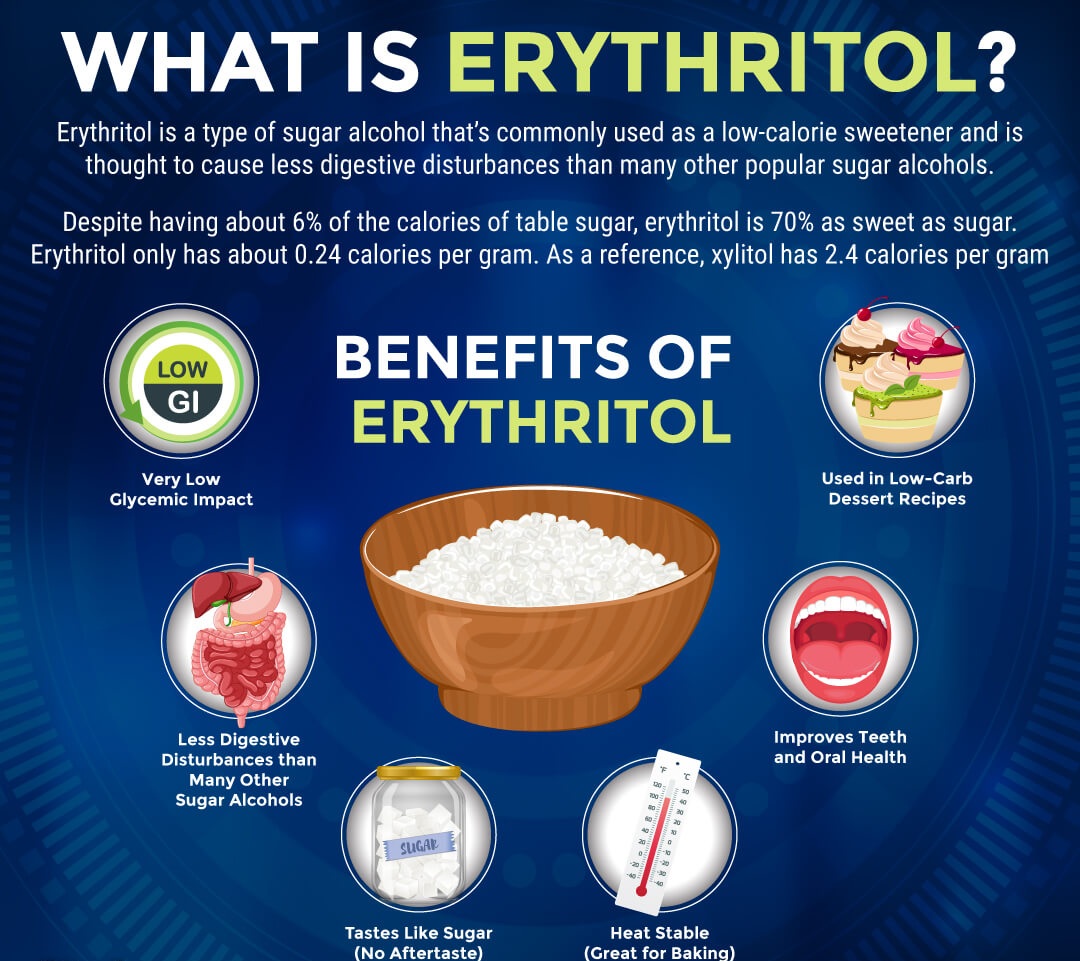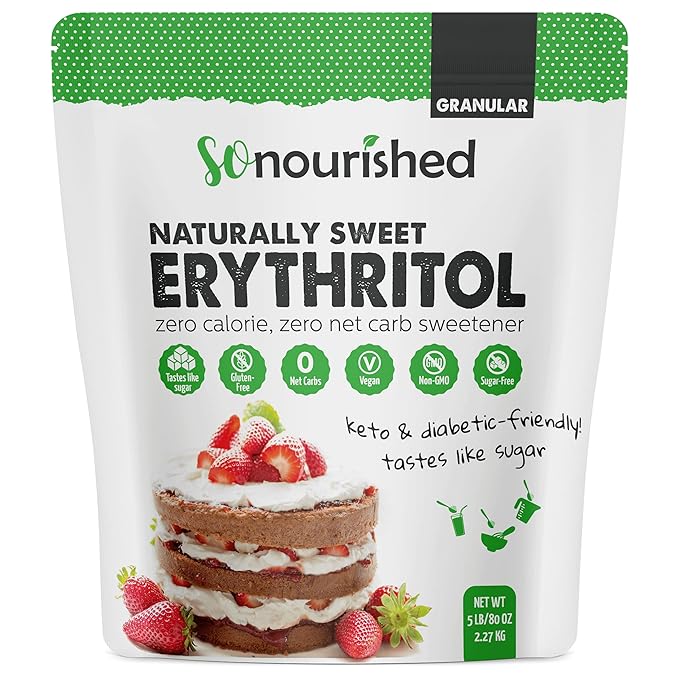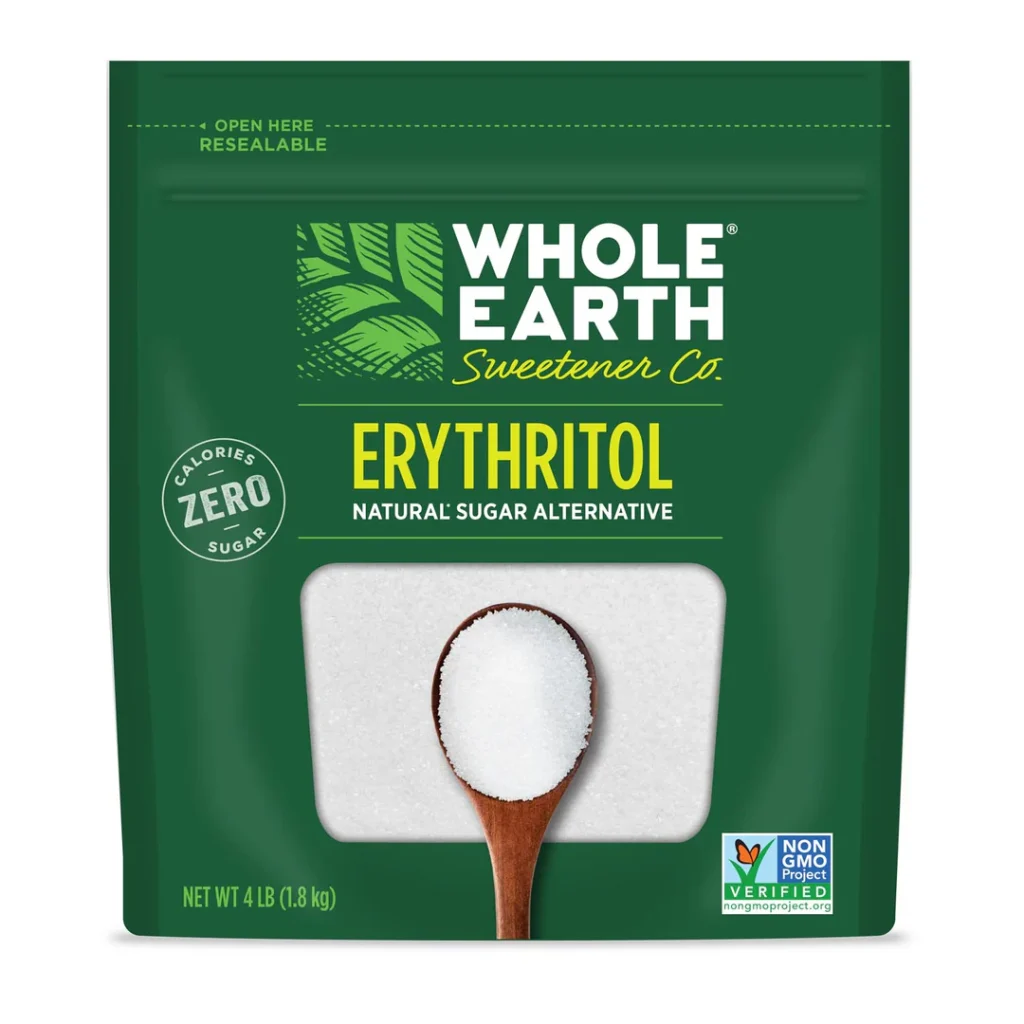What’s Erythritol sweetener ?
Erythritol sweetener is a sugar alcohol used as a low calorie sweetener. Eating a large amount of it may cause digestive issues, including nausea. It may also be associated with blood clots and heart problems. Sensitivity and symptoms can vary.
The low calorie sweetener erythritol may seem too good to be true. It’s natural, doesn’t cause side effects, and tastes almost exactly like sugar — without the calories.
Basically, it has all the positive aspects of regular sugar without any of the negatives, although some media outlets question its benefits.
This evidence-based article reviews the benefits and possible side effects of erythritol.

What exactly is erythritol?
Erythritol belongs to a class of compounds called sugar alcohols. Food producers use many sugar alcohols such as xylitol, sorbitol, and maltitol. Most of them function as low calorie sweeteners in sugar free or low sugar products.
Most sugar alcohols are found in small amounts in nature, especially in fruits and vegetables. Because of the way these molecules are structured, they can stimulate the sweet taste receptors on your tongue.
However, erythritol appears to be quite different from the other sugar alcohols.
To begin with, it contains many fewer calories:
- Table sugar: 4 calories per gram
- Xylitol: 2.4 calories per gram
- Erythritol: 0.24 calories per gram
With only 6% of the calories of sugar, it still provides 70% of the sweetness.
In large-scale production, erythritol sweetener is created when a type of yeast ferments glucose from corn or wheat starch. The final product looks like powdery white crystals.
Benefits of Erythritol sweetener

1. May Promote Healthy Blood Sugar Levels
2. Has a Very Low Glycemic Index
3. May Curb Sugar Consumption
4. May Help Reduce Calorie Intake
5. Could Protect Dental Health
Foods high in Erythritol

What does erythritol sweetener do for you?
Unlike the other sugar alcohols, most of the erythritol you consume is absorbed into your bloodstream and travels through your body before being excreted unchanged in your urine. That makes it relatively safe.
Is erythritol good or bad for you?
Overall, erythritol appears to be a good alternative sweetener. It contains almost no calories and has 70% of the sweetness of sugar.
Human studies have mostly shown very few side effects, though some have recently been found and need further study. Studies in which animals are fed massive amounts of erythritol for long periods show no adverse effects.
Is erythritol safer than sugar?
Unlike sugar, erythritol doesn’t raise blood sugar or insulin levels. That said, some people may experience adverse side effects. The best option is to read labels and reduce added sweeteners such as sugar alcohols and refined white sugar as much as possible.
Is erythritol safe?
Overall, erythritol sweetener may be safe for some people but not for others. Research on its toxicity and effects on metabolism has found it to be safe for both human and animal consumption.
However, recent research has suggested that erythritol may be associated with the development of blood clots and heart attacks.
In addition, due to their unique chemical structure, most sugar alcohols pass unchanged through most of your digestive system into the colon, where they’re fermented using resident bacteria. This can produce gas as a byproduct and means you could experience bloating and digestive upset. In fact, sugar alcohols like erythritol belong to a category of fibers known as FODMAPs.
Erythritol sweetener is different from other sugar alcohols. Most of it gets absorbed into your bloodstream before it reaches your colon. It circulates in your blood for a while and is eventually excreted, unchanged, in your urine. About 90% of erythritol is excreted this way.
Older feeding studies found that providing 0.7 to 1 gram of erythritol per kilogram (2.2 pounds) of body weight was very well tolerated. However, another older study showed that 50 grams of erythritol in a single dose increased nausea and stomach rumbling.
So unless you’re eating massive amounts of erythritol at a time, it’s unlikely to cause a stomach upset. However, erythritol sensitivity may vary from person to person.

The main brand of Erythritol in the market



